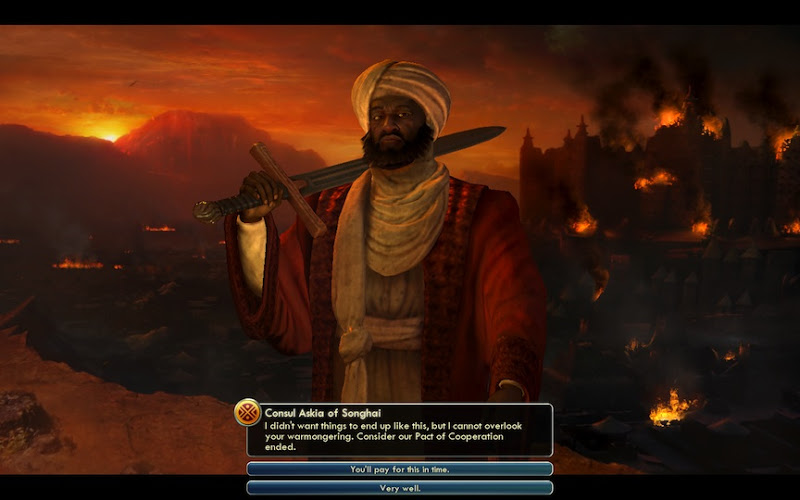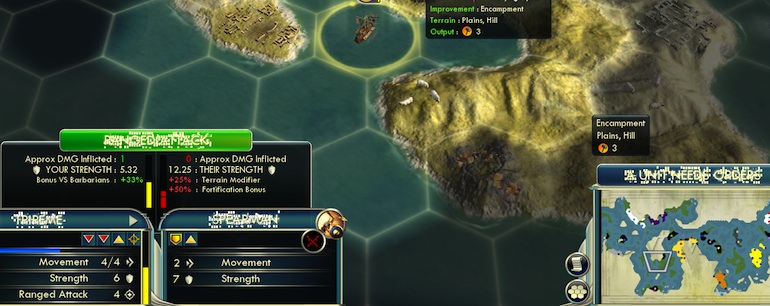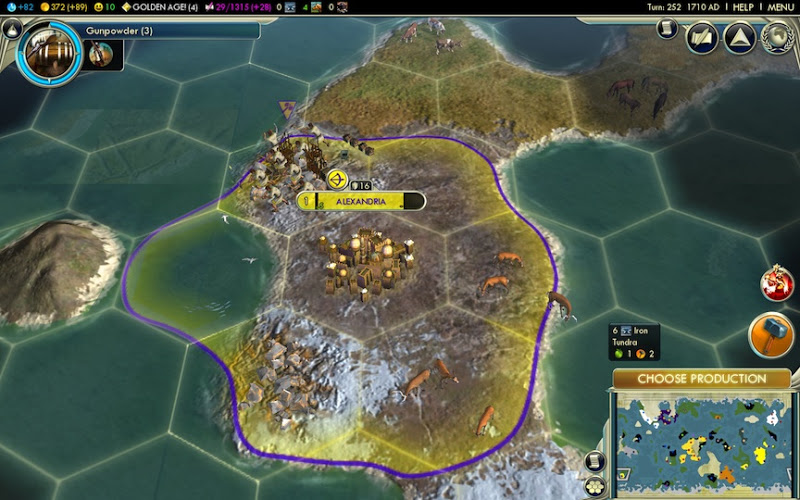This post has not been edited by the GamesBeat staff. Opinions by GamesBeat community writers do not necessarily reflect those of the staff.
Hello and welcome to Game Diary: Civilization 5, the ongoing story of my first campaign in the latest entry of Sid Meier's beloved turn-based strategy series. Last time, my long campaign of war against the city-state of Genoa came to a satisfying end, with the city falling under my control. I also gained a new ally in the city-state of Hanoi and made considerable technological progress in a short space of time — researching Steel, Banking, and Engineering in just six turns.
29 October 2010
The Songhai civilization called an end to our Pact of Cooperation because of my warmongering, then threatened me the very next turn with a message to watch my back. I kind of want them to declare war on me. They are perhaps my nearest non-city-state neighbor, and strike me as being a civilization I can destroy easily — although my military advisor warns that they currently have a larger army than me.

Pot, meet kettle.
With no war currently occupying my troops, I figured I might as well use one of my Great Generals, so I entered my third Golden Age.
Before continuing, though, I had to deal with a graphical glitch. Some of the text became garbled and artifacts appeared on the screen. I was always expecting to run into problems, since my graphics card is just below the minimum requirements, but this concerns me. I’m only halfway through a game with “normal” map size and near-minimum graphics settings. If it’s struggling now, how will it cope with the end-game? At least a simple-yet-inconvenient restart of the application seems to clear up any problems when they occur.

In the next hundred years, my civilization was ranked “Most Literate” in the world, thanks to my technological prowess, was the first to meet the city-state of Copenhagen (yes, somehow they remained unmet until 1450 AD), and received its second Great Scientist, who was sent to construct an academy on a nearby desert tile — for a sizable bonus in science output. I suspect that Thebes — my capital city — is now the world leader in science, with a per-turn output that is more than quadruple its population size (of 13).
In 1480 AD, my civilization discovered the secrets of Astronomy. This meant I could build Caravel, a relatively powerful and fast naval unit, and could cross ocean tiles. I could explore the entire world, and could at last cross the ocean blocking my civilization from moving east — up until this point I could go almost all the way around the world from my home island, as long as I travelled west.
I sent units out in all directions. I love exploring the map. What better time to do it with some embarked land units helping out than while I’m at peace with everyone?
I formed a new friendship, and subsequent alliance, with the city-state of Brussels after recovering one of their captured workers from a Barbarian encampment (and returning it to them). This relationship will give me a healthy boost of twelve culture points per turn.
Both my people and the city-state of Hanoi were delighted when my scout found the Mt. Fuji Natural Wonder near Vienna, such that I gained a happiness boost and further ingrained alliance with Hanoi.
Things continued to go my way as the very next turn I completed the Tradition policy branch, which puts me one step closer to a cultural victory. I took a moment to ponder what victory type I should be aiming for, and quickly decided that science/technology looked like my best option. As the most technologically advanced civilization, it seems reasonable to think that I’d be the favorite in the Space Race. But this technological edge could perhaps lead to a more aggressive path to victory — if, say, I use it to build an army with units more powerful than anything my rivals can match.
The exploration of the map continued more-or-less smoothly, with Ancient Ruins found on several occasions, Barbarian encampments crushed left and right, and several potential sites for my next city uncovered. But it was not without losses. The horseman unit that provided last-minute assistance in the war against Genoa was ambushed by Barbarians while embarking on an unexplored island. Both it and my remaining Great General were destroyed. I promptly exacted my revenge.
Meanwhile, Caesar continued to push for a friendly relationship between our two nations. When he offered a Pact of Cooperation in 1650, I agreed, seeing no point in precipitating war when I had only two units that could be used in the conflict — the others either being too weak or having been sent home to protect my territory.

Note the presence of two iron tiles, two deer tiles, one fish tile, and nearby cows and horses. This will be a great city…eventually.
Yet more major progress was made in the following decades. I got Scientific Theory, which reveals coal on the map, in 1675. Thirty years later, my decision to adopt Rationalism triggered yet another Golden Age — that’s four now. In 1710, I sent some units to an island south-east of my homeland to found a new city, Alexandria, amongst several strategic and luxury resources — most importantly two tiles with iron.
The value of iron dropped considerably just a few turns later, however, as I gained the secrets of Gunpowder, which gives me the ability to build Musketmen — a game-changing military unit. Another Great Scientist, amusingly titled “Egyptian Plato,” was born in the same turn. I used this one to discover a new technology, choosing Archaeology — partly because it was the one technology I could not research in less than ten turns, and partly because it enables the construction of three buildings that can provide a huge culture boost.
The Songhai are giving every indication that they’ll declare war on me in a few turns, so I may get to play with these new technologies soon. I can’t wait.
Quote of the session: “Those who cannot remember the past are condemned to repeat it.” -George Santayana. I couldn’t agree more.
Previous entries:
- Game Diary: Civilization 5
- Game Diary #2: CIvilization 5
- Game Diary #3: Civilization 5
- Game Diary #4: Civilization 5
- Game Diary #5: Civilization 5
Later entries:
- Game Diary #7: Civilization 5
- Game Diary #8: Civilization 5
- Game Diary #9: Civilization 5
- Game Diary #10: Civilization 5
- Game Diary #11: Civilization 5
- Game Diary #12: Civilization 5
- Game Diary #13: Civilization 5
- Game Diary #14: Civilization 5
Starting conditions
I decided to go with Prince (“normal”) difficulty on a standard map size, with standard game length. My civilization was determined randomly, as were my opponents and the map itself.
